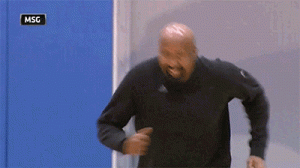I'll keep on making posts and engaging members in a positive way so that one day you will unambiguously not regret your past restraint but please let it be known that I was never even in the same league with this crop of pro Trump zealots who really do believe that people of color are less worthy of basic human rights and respect and dignity. Today's bigots are laying the intellectual and moral ground work for future subjugation and genocides of people of color. These people have accepted that there will never be enough resources to provide everyone with a decent life so they use white identity politics to sort humanity into the category of worthy and unworthy. I never would have been down with that, my 2008 self would have asked how do we make enough resources available so that such brutal economic triage will never have to happen.
I realize that distinction is important to you and I have no problem further clarifying my comments, but I don't think you have a perfect recollection of exactly the sorts of things you defended during those days. Rather than put you on blast here with a laundry list of offensive positions you once argued, I'm happy to take some time to discuss via PM. It's not really central to the point I was making.
I imagine it frustrates you to have your past repeatedly brought up. Unfortunately, I can't think of any other examples of users who've "reformed" in the same way, who made certain types of offensive statements and later recanted them, rather than slipping up and rendering, in explicit terms, that which was merely implied by serving as an apologist for racial inequality.
You were a determined, if not belligerent, proponent of "culture of poverty" explanations for social inequality, including racial inequality. While that was the "new Coke" of scientific racism in the 1980's, and distinct from biological inferiority, its policy prescriptions were about far more than mere "post-racial" denials of culpability. What are attempts to justify, if not sanctify, contemporary racial inequality if not laying the groundwork for
continued subjugation?
That you considered the status quo "better than the alternative," rather than an ideal goal state, offered little salve. You routinely dismissed or minimized the persistence of racism and the experiences of those made to endure it. How would you interpret such sentiments today?
We have lost some of the older posts, and formatting issues have rendered others difficult to read, but I'd wager that if you took a stroll down memory lane you'd understand where I'm coming from on this.
A substantial number of those who've been banned for outright racist hate speech in recent years were people you co-signed for back then, and who, in turn, routinely agreed with you. Whether or not you were in the same category depends on how you choose to define the boundaries. I'm sure you want to separate yourself, but a lot of us who posted back then feel that you had more in common with those other users than you'd care to admit. Are there differences? Yes, and I never suggested otherwise.
Dustin Hoffman isn't Bill Cosby or Roy Moore, but he also doesn't get to decide whether his actions caused harm based on his recollection or intentions.
If his main concern right now is "hey, don't lump me in with those freaks, and that was a long time ago" his focus is in the wrong place.
Overt White Supremacist hate speech has always been "ban on sight." That's not really the issue here. The challenge (and frustration) revolves around when and where staff members take action against those who make racially derogatory statements in more subtle ways.
To extend the Hoffman metaphor: someone doesn't have to engage in unwanted physical contact to contribute to a toxic workplace environment. If lewd, insulting comments become normative, commonplace, sanctioned, or just frequently
overlooked, that's more than enough.
That's where I feel your posts fit in.
Should I have allowed them, or others like them? There's no easy answer to that, and it's a question I find myself returning to in situations like this one.
We value diversity, and would like to use that diversity in constructive ways, but that shouldn't come at the expense of making the community safe and welcoming. There's value in a sanctuary, too, especially as there are fewer and fewer real choices in online communities now, due to the increasing consolidation of social media.
You're an example of someone whose views have changed, and you've given some credit for that to your interactions with our fellow community members. In that respect, it could be argued that the patience paid off for you - though it was the community, not you, that paid the price.
Was it worth it? I don't know.
Even as I disagreed with you and was, frankly, disgusted by much of what you posted years ago, I honestly tried (sometimes to perceptible strain and with questionable success) to treat you with respect. Revenge should never be mistaken for justice.
Today's White Nationalists are terrified of backlash and retribution. They're scared they'll become the oppressed minority soon, and many have convinced themselves that they already are. Public Enemy had it right in 1990.
NikeTalk was a "majority minority" community from the very start - which is precisely why it, and its predecessors, have been such lightning rods for White Supremacists. It is, in some ways, a microcosm of what they fear. I'd argue that such fear is misplaced. Ignorance is best treated through education, not execution or exile.
Online communities were still a relatively recent development in the late '90's. I wasn't able to access the Internet until mid-way through high school, as PC's were vastly more expensive in those days. I didn't grow up with technology, and its sudden introduction in my life was a liberating experience in many ways. It would sound silly to someone long accustomed to the Internet, but just being free to type in dialect and use slang freely in a written exchange felt like a big deal. If you were an adolescent, bristling under the authority of parents and teachers, you'd likely use that freedom like Macaulay Culkin in Home Alone, stay up all night, eat ice cream for breakfast, read Playboy, and curse up a storm. For idealists, though, it was an opportunity to design a better system than those we inherited. That's what we've tried to do with NikeTalk.
What kind of society do you want? What kind of future do you want? We demonstrate that through the institutions we create and through how we treat one another.
When designing NikeTalk, we chose to build it on the principles of mutual respect.
From a pragmatic standpoint, banning everyone who would so much as risk damaging the community makes sense. If you can choose, why choose to share a community with bigots? Err on the side of caution and purge anyone who seems suspect. That's clearly the strategy many people here would prefer, and I can understand why. Perceived anonymity can do horrible things to people, and many of them were pretty horrible to begin with. Everyone's sick of dealing with online abuse. Why be patient with anyone? They don't deserve it.
The idealist's path, though, was to try to be the change we wanted to see in the world.
We don't want to eliminate all those with whom we disagree. As long as you're here in good faith, practice civility, and demonstrate respect, there is a place for you.
Don't promote the false peace that is the absence of tension. Strive, instead, for justice.
I believe in those values and I still believe that's a worthy effort. It does, however, come at a cost - and, as usual, that cost is rarely paid by the privileged.












